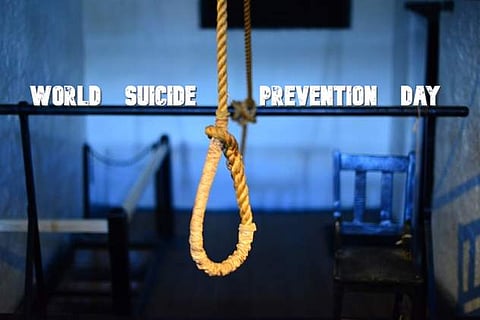

According the World Health Organisation’s (WHO) latest report, India has the highest suicide rate in the South-East Asian region. The report released on September 9, a day before World Suicide Prevention Day laid out that India’s suicide rate at 16.5 suicides per 100,000 people. Sri Lanka stands second in the region with a suicide rate of 14.6 and Thailand (14.4) third. India also had the third-highest female suicide rate (14.7) in the world after Lesotho (24.4) and the Republic of Korea (15.4), according to the data pertaining to the WHO estimates of 2016.
"Depression is the single-most common cause of suicide," says Dr Anindya Kumar Roy, a well-known psychiatrist from Kolkata. On World Suicide Prevention Day, he explains to us what risk factors lead to an individual committing the act, the signs that we should look out for in people and finally how it can prevented from the root of it.
If you see these signs in your near and dear, BE WARNED:
- Not all of who are depressed end up committing suicide, most of the times 25 per cent of the people who are depressed can actually get through with it. The remaining 75 per cent might just have suicidal thoughts which are pretty much preventable and curable if proper care is taken from the beginning.
- Individuals who feel alone, have a weaker support system around them, are impulsive, anxious, and are indulging in substance abuse are more prone to having suicidal thoughts. Depression along with all these factors can lead to a person actually committing suicide.
- Impulsive self-harm is another sign or factor in this case. People who don't have depression but are impulsive and emotionally unstable, they have a tendency to act suddenly.
- Suicide mainly can be put under two kinds of acts:
A planned act, which is more lethal. During a planned act, an individual has already tried and tested medicines, planned a timeline and thus it is more probable for that person to go through with it.
An impulsive act, which is not at all planned but randomly taking in tablets, slashing of wrists, in these cases, the probability of the act being lethal is way less. Impulsive acts occur more at a young age when they don't know the consequences or the seriousness of the lethality of the attempt thus leading to completion.
- When at an old age, people might suffer from associated illness, mental illness or something like cancer, and they are more prone to suicide when they start slightly improving from the condition. When their illness or condition is too serious they can't execute it, then they come back and recover a bit, sadness is still prevalent, then they are the most vulnerable. Individuals start improving — like people taken to asylums earlier, their condition improves and they come back home and then they have a tendency to commit at that point as they feel there is no hope for them as it is a prolonged illness. They have long-term consequences, no future, and thus in this transitioning state it occurs more frequently.
- Helplessness, worthlessness, hopelessness all together combined leads to a completion of the act. Reaching the hopelessness stage means the person is closer to committing suicide.
- Young and old ages are the most vulnerable periods. They feel lonely or they fail they communicate and thus assessing the risk factors properly is essential.
- If talking about suicide makes the person feel guilty then that is the most vulnerable scenario or period. They think suicide is a crime, it's a shameful act, so they won't share their thoughts. It has been statistically proven that they don't share it because of guilt. If they also lonely at this point, they will move towards a more planned act.
How you can remedy the situation FAST:
- It is important to identify the risk factors at an early stage. If a person is suffering from depression, then added stress could lead to being more prone. Young children, specially, shouldn't be made to feel helpless. Failure shoudn't make them feel worthless.
- When explaining a suicide case, the vocabulary should be kept in mind and one should never call a suicide successful or unsuccessful but instead say complete or incomplete.
- Suicide should be clearly and openly discussed. Indicuals should understand it's a common phenomenon. If people feel comfortable they will come out and speak and then they should be provided with options to prevent them.
- Suicidal contract is the first step of prevention — share thoughts with close, confiding people. You need to hold on to your thoughts, discuss with friends and family and they should encourage them to not attempt it or be impulsive.
- Explain, talk to them, tell them that lot of people go through this, it is a curable condition, try and get through it you will recover, people do. That's what people with suicidal thoughts should be told. If it's at a higher stage then take help of a mental health professional.
- Do not probe or poke an already vulnerable person, then they will not share. Psychological autopsy is when after the suicide, media makes a big deal out of the story behind it and that can be extremely overwhelming and harmful for the people around.
- Never tell young people with suicidal thoughts that you have everything and so why are you having such thoughts, then they will stop sharing. Just support them to overcome it.
- A mental health doctor should also guide the family or friends by telling them to discuss it openly, asking them to enquire about what it exactly is, become more aware.
